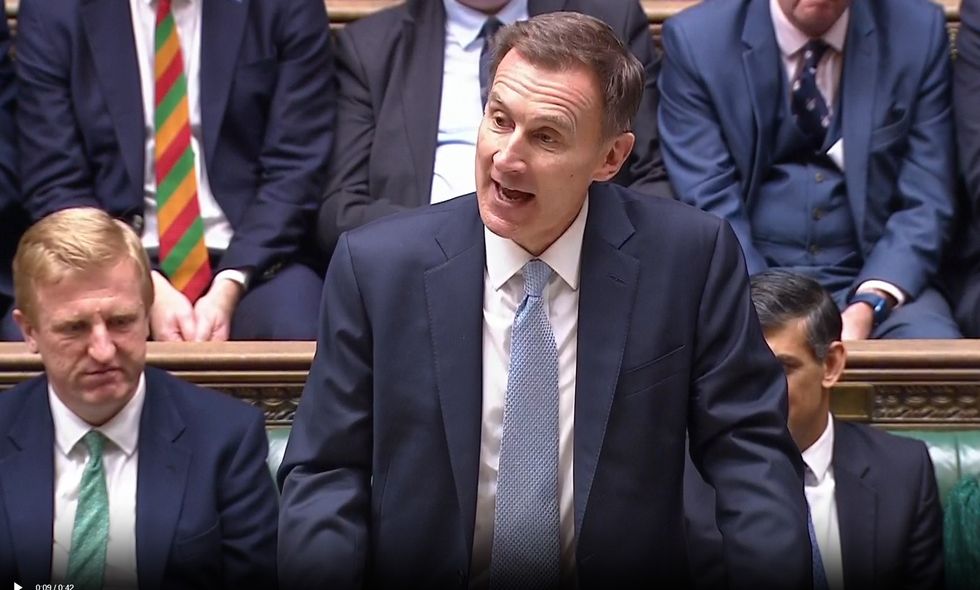Pensioners have criticised the Chancellor’s Spring Budget, claiming they were “missed out” in the measures he announced yesterday
Don't Miss
Most Read
Trending on GB News
Pensioners will be £770 poorer in retirement as a result of the policies announced in Jeremy Hunt’s Spring Budget, according to a leading think tank.
The Chancellor confirmed a wave of new fiscal measures yesterday, including cuts to the National Insurance rate, a reduction in the higher rate of capital gains tax (CGT) on property and an overhaul of non-dom rules.
Analysis from the Resolution Foundation found that families are set to gain £420 a year on average with these policies, with the poorest fifth of Britons getting a £840 boost.
However, the think tank’s research showed that households headed by someone aged 66 or over will be hit with an average loss of £770 a year.
How will your finances be impacted by Chancellor Jeremy Hunt's Spring Budget? Find out using GB News' 2024 tax calculator here.

Pensioners are at risk of a poorer retirement after the Spring Budget
GETTY
Those aged 18 to 45 will be £450 better off on average from Mr Hunt’s tax cuts and wider fiscal reform, analysis suggests.
Despite the Government previously pledging to keep the state pension triple lock in place, older Britons were largely left out of the Spring Budget.
This comes as real household disposable income (RHDI) in the UK is set to plummet by 0.9 per cent in 2024.
Under Prime Minister Rishi Sunak’s premiership, this will be the first parliament in modern history to report a fall in living standards.
Torsten Bell, the chief executive of the Resolution Foundation, claimed the Government has “reversed course” from its approach to the economy in the 2010s.
He explained: “Back then, support was focused on pensioners and takeaways on poorer, younger households. This time it is those aged over 65 and on the highest incomes who are set to lose most.
“But while tax and benefit strategies have been reversed, spending priorities have been rehashed. The £19billion of cuts to unprotected public services after the next election are three-quarters the size of those delivered in the early 2010s.
“The idea that such cuts can be delivered in the face of already faltering public services is a fiscal fiction.”
LATEST DEVELOPMENTS:

Mr Hunt outlined the Government's changes to taxes yesterday which pensioners were left out of
PASome 78 per cent of the personal tax cuts announced by Jeremy Hunt are expected to go to the richest half of households, the Resolution Foundation reports. Despite this, Mr Hunt defended his tenure as Chancellor and retreated his aim of bringing down the tax burden while speaking to Times Radio.
Mr Hunt said: “I’m not pretending that I brought all those taxes down in one go. We can’t afford to do that.
“It wouldn’t be responsible to do that. But do I want to carry on bringing them down, as I did yesterday, as I did in the Autumn Statement? Yes, I do.”
State pension payments will be awarded a 8.5 per cent rate hike in April thanks to the triple lock. Speaking to GB News, Robert Buckland MP cited the Government’s past track record of helping people in retirement.
He shared: “The triple lock has been the single biggest increase in state pension that we've seen, ever. We've done a huge amount for our pensioners, we continue to support them, and I think we can be proud of the record that we've maintained and we've stuck to it, despite pressure to drop the triple lock, that we've heard so many times before."
A DWP spokesperson said: “Our Triple Lock resulted in the biggest State Pension increase in history last year. We are delivering a further increase of 8.5 per cent in April, making the basic state pension £3,700 higher than in 2010. This is significantly above inflation which is forecast to fall below the two per cent target in the second quarter of this year, according to the independent OBR.
“We are also curbing inflation to help everyone’s money go further, boosting Pension Credit – worth on average £3,900 a year for pensioners on the lowest incomes – and have made more than 11.9 million Pensioner Cost of Living payments to help with essential costs this winter.”









